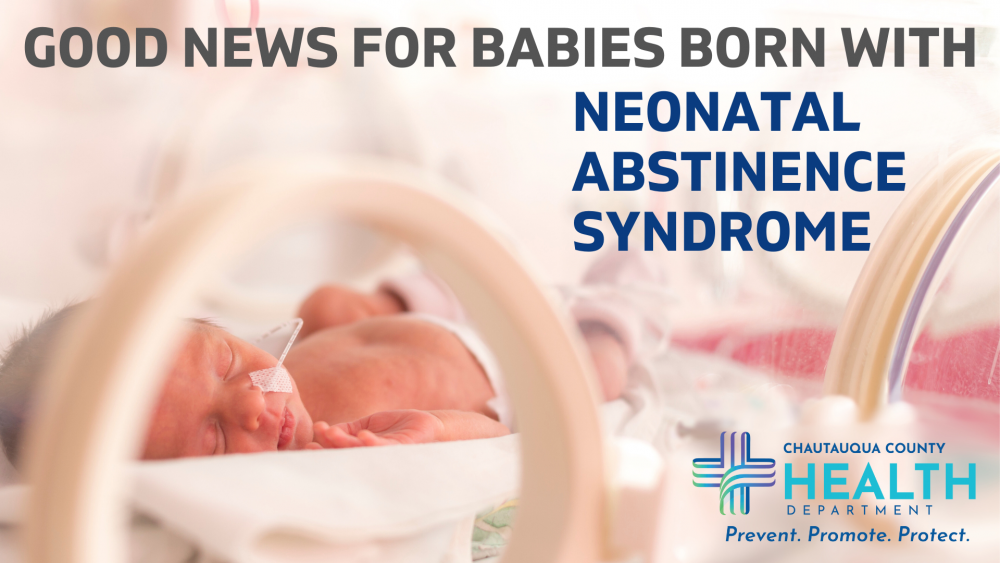
MAYVILLE, N.Y. – As National Children’s Health Month comes to a close this October, the Chautauqua County Health Department (CCHD) would like to take this opportunity to highlight the important work being done to combat Neonatal Abstinence Syndrome (NAS), a syndrome that has been afflicted for more than Known for 20 years is 50 years, affecting many newborns here in Chautauqua County. The New York State Department of Health (NYSDOH) recognizes the importance of early intervention services for childrenen with NAS and now allow them to automatically qualify for the services provided through the CCHD.
According to the NYSDOH Opioid Data Dashboard, Chautauqua County has a higher rate of babies diagnosed with neonatal withdrawal syndrome or affected by maternal drug use than comparison groups statewide. NAS occurs when newborns experience withdrawal symptoms after exposure to opioids, antidepressants, barbiturates, or benzodiazepines (sedatives) during pregnancy. Some of the withdrawal symptoms, including tremors, irritability, sleep disturbances, and seizures, typically occur within 72 hours of birth. Factors that influence the severity of symptoms include the type and amount of substance exposure, the timing of substance use, and whether the child was born full-term or premature.
For the first time, children with NAS are eligible for CCHD’s Early Intervention Program, which ensures children affected by exposure are connected to health resources, home supports and intervention strategies sooner, leading to improved health outcomes more quickly.
Amy Snyder, who provides occupational therapy services for CCHD’s early intervention program, fully supports this addition. Amy explains: “This new automatic qualification means babies can be assessed straight away rather than having to wait for a referral from the doctor or hospital and then go through the longer assessment process. The therapist can assess the baby’s developmental level at each visit and make prompt suggestions to the caregivers. Babies born positive are at higher risk of developmental delays. They often have difficulty with their regulatory skills and are unable to self-soothe; You may be irritable and nervous and have problems eating, such as: B. poor absorbency. It is much easier to flag an atypical movement or sign and prevent it from becoming a pattern than to go back and correct it once it is part of the child’s repertoire.”
Early Intervention Program staff work with children and their families from birth to age three, providing help and support to promote development based on the child’s individual needs. Services are provided free of charge to the child’s family and include developmental assessments, home visits, speech, physical and other therapies.
“It is a very meaningful task for us in the health department to stand up for and work with the most vulnerable among us. Promoting the health and brighter future of our children is not only central to our work as a department, but also critical to the health of our public. We are excited to be able to reach more babies and families sooner,” said Lacey Wilson, Chautauqua County Public Health Director. “Our EI program is just one of our many wonderful maternal and baby health programs designed to promote happy, healthy lives and prevent poor outcomes. We are thrilled to be able to expand our reach in this way as we continue to work with our community partners to ensure a healthier future for our children!”
The Early Intervention Program provides services to support families with children, including:
- Health resources: Provide resources related to developmental disorders associated with NAS, such as prematurity, seizures, gastritis, and failure to thrive.
- On-site support: Working with the child in their home environment in the context of the child and family’s daily routines and activities.
- Strategies and interventions: Helping families identify specific strategies and interventions, such as: E.g. feeding difficulties, adaptation to sensory stimuli, sleeping, learning and social interaction.
- Connection to resources: Facilitating referrals to services that address substance abuse, mental health, medical care, and other supports.
For more information about CCHD’s early intervention program, visit HealthyCHQ.com/Kids.
For more information about NAS, visit the Center for Disease Control and Prevention website at: https://www.cdc.gov/opioid-use-during-pregnancy/about/.
About the Chautauqua County Health Department – The Chautauqua County Health Department is Chautauqua County’s leading public health organization dedicated to supporting the health of the community. The Department of Health takes innovative approaches to provide technical assistance to partner organizations and offers a variety of programs and services to prevent disease, protect the health of the public, and promote the overall health and well-being of our community. For more information, see www.HealthyCHQ.com.
